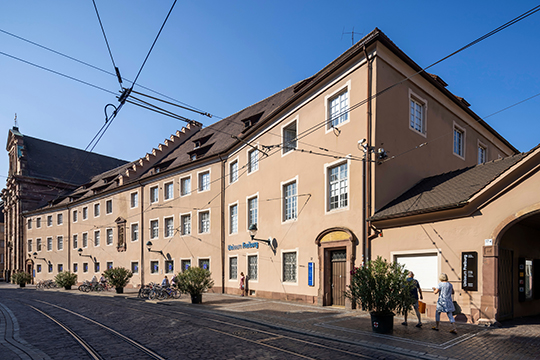A European eye for complex issues
Freiburg, May 17, 2021
With more than 300,000 students, eight partner universities, six countries, one virtual campus - the EU-funded project Epicur - European Partnership for an Innovative Campus Unifying Regions aims to set new trends in teaching. One of the ways this is to be achieved is with an interdisciplinary European study program based on innovative teaching formats. At the University of Freiburg, Dr. Kerstin Fest, Stefanie Klose and Dr. Steven Randall of the University College Freiburg (UCF) are developing content for this international project.

Epicur will offer teaching formats to prepare students for multidisciplinary solutions to the manifold challenges of the 21st century. Photo: smolaw11/stock.adobe.com
Kerstin Fest, Stefanie Klose and Steven Randall have a vision - they want to develop a European bachelor's degree program that is based on the Liberal Arts and Sciences (LAS) in terms of didactics and content, and which can be taken in parallel in several countries. At its core are interactive teaching formats that prepare students to develop interdisciplinary approaches to the complex challenges of the 21st century. Together with colleagues from the Karlsruhe Institute of Technology, the Universities of Strasbourg and Haute Alsace, France, the University of Amsterdam in the Netherlands, the Adam Mickiewicz University of Poznań in Poland, the University of Natural Resources and Life Sciences in Vienna, Austria, and the Aristotle University of Thessaloniki in Greece, they seek to bring this idea to life in an Epicur project.
The European Union approved the project in 2019; the pilot phase began in 2020. The partners in the network contribute their respective strengths to Epicur; Freiburg is the leader in the field of LAS teaching. The project started with a big idea, and now it's a matter of testing how this comprehensive project can be realized in practice, the project team explains. As teachers at UCF, they are each developing a course for Epicur. Kerstin Fest is designing classes on "European Identities," Stefanie Klose on "Ecological and Social Sustainability," and Steven Randall is developing concepts that teach core skills in academic work and writing.
Re-thinking teaching
How are Epicur courses different from other courses? "We are moving away from traditional concepts, for example, by replacing chalk-and-talk teaching with skills-based courses that specifically promote communication and co-operation between international students as well as solution-oriented thinking," says Fest. “So the courses - which will take place primarily online but also in the form of excursions and summer schools - will not merely teach specialist knowledge," adds Klose. “Nor will there be any conventional majors and minors. We want students to develop more freely. For us, this includes helping to shape the curriculum and allowing them to choose the focus of their studies," Randall continues. Instead of exams, homework or seminar papers, graded final projects and group work are conceivable - for example, in the form of presentations, podcast series or video clips.
Pilot courses well received
In the winter semester 2020-21, Epicur pilot courses focusing on "LAS" and "Language and Culture" ran for the first time. These were, on the one hand, specially designed classes and, on the other hand, existing courses that were didactically adapted to the Epicur idea and offered a quota for Epicur students. The seminars were open to all students of Epicur universities. One example is the pilot course "Mediated Modelling for Sustainability", which Stefanie Klose organized along with Andreas Zitek, an Austrian colleague, between December 2020 and February 2021.

The Liberal Arts and Sciences program is the heart of University College Freiburg. Photo: Jürgen Gocke
The aim of the online course was to broaden the participants' view of current sustainability problems and strengthen their understanding of causal relationships. "With the help of a new software tool, the students had to analyze real case studies from the field of sustainability and then create and present models for the challenges dealt with," says Klose, summarizing the content of the course. To strengthen the participants' self-motivation, they were left to suggest topics for case studies. One of the ways in which the collaborative teaching approach was realized was by the international students working together in groups and the teams having the opportunity to exchange ideas and give each other tips.
The success of the instructors' concept was reflected in the students' feedback showed. In a questionnaire, some respondents noted that the course had fulfilled or even exceeded their expectations - for example, because various tools were introduced for creating models and solving tasks together across spatial distances. Some indicated that they would continue to use what they had learned. The helpful support and accessibility of the instructors - who were available for queries via video conference - was also appreciated. The fact that Epicur offered the chance to attend courses with teachers from other universities was also seen as a great benefit by the students.
In Freiburg as well as at the Polish and Greek partner university, the Epicur pilot courses have already entered the second round. In cooperation with Poznań, Steven Randall has been offering the course "A Multilingual Map of Europe" since March 2021. The name says it all: In three modules, students learn about multilingualism in Europe with a view to diversity, identity and its local spread. At the end of the course, the results of their group work will be compiled into a large European map. Randall sees an asset in having international students work together on complex issues, "Everyone brings different experiences, backgrounds and approaches to the problem and incorporates them into the courses. As a result, students learn to challenge their country-specific perspectives."
Big plans for the second half
Kerstin Fest says the results of the pilot phase so far have been positive: "As a network, we have made arrangements for the mutual recognition of academic credits and created a legal framework that ensures the free movement of students between the participating countries. This step in particular was important so that students can also take courses locally at several Epicur universities." Unless it is extended due to the coronavirus pandemic, the pilot phase will end in November 2022, by which time the bachelor's degree program, accredited in all participating countries, should be up and running, a common didactic understanding of LAS created, and a set of criteria for Epicur courses applicable to all collaborating universities established. To move the project forward together, all participants meet in monthly meetings and thematic discussions via video. Fest, Klose and Randall are optimistic that in one to two years all processes will be running smoothly.
Kristin Schwarz
Epicur – European Partnership for an Innovative Campus Unifying Regions

